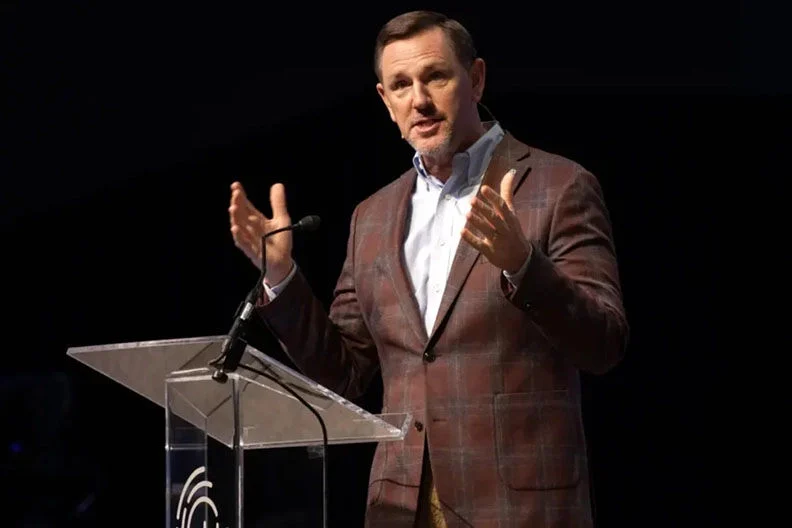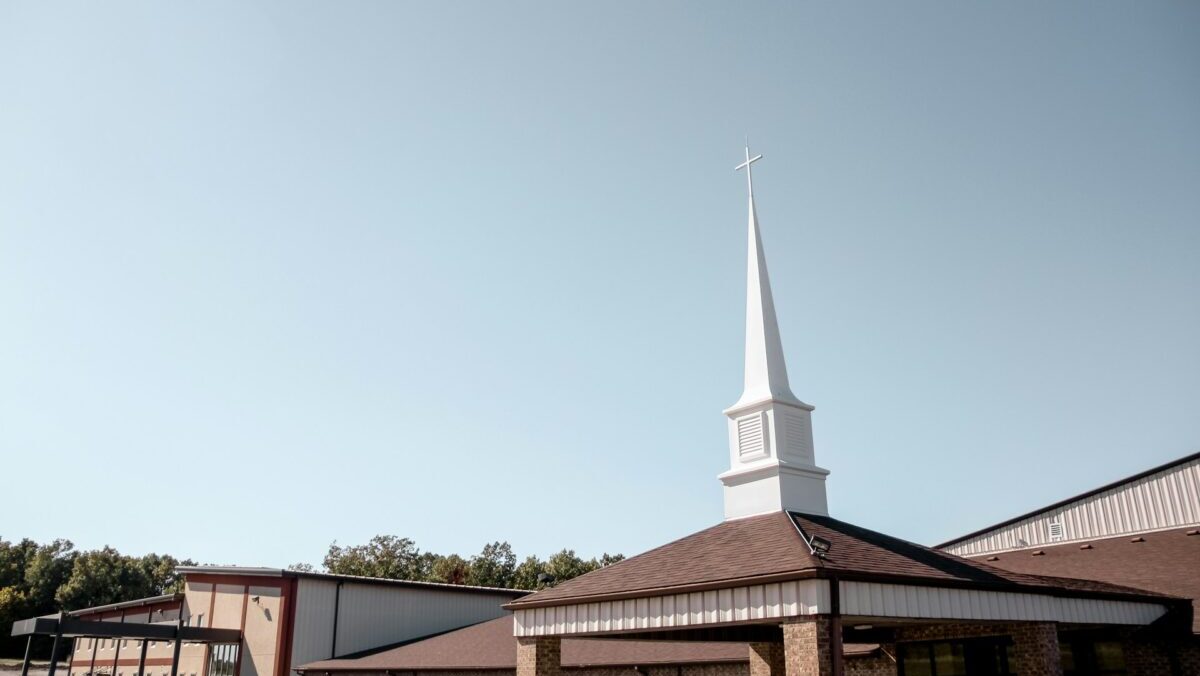By Christi Hall
State Convention of Baptists in Ohio
In today’s tumultuous times, the divide between law enforcement and the communities they serve seems wider than ever. The role of the church in bridging this gap cannot be overstated. As ministry leaders, it’s essential to recognize that the church holds a unique position to support and uplift those who put their lives on the line for our safety every day.
Establishing a law enforcement ministry requires a shift in mindset — one that focuses on practical support and genuine relationship-building rather than viewing it solely as an opportunity for evangelism.
God has called us to be a people of justice — to love our neighbors as ourselves. This includes extending our support and gratitude to those who serve in law enforcement.

A law enforcement ministry is not merely an outreach event held within the confines of the church; it’s a commitment to be the hands and feet of Jesus to those who tirelessly protect and serve our communities.
Culture and needs
Understanding the culture and needs of law enforcement is paramount. Instead of expecting officers to come to us, we must go to them.
This involves learning about their unique challenges, developing a plan tailored to their needs, and ultimately establishing a rapport built on trust and respect.
Just as a missionary lives among the people they serve, a crisis-trained chaplain or ministry team must immerse themselves in the law enforcement community, becoming a conduit between the church and those in uniform.
It’s crucial to recognize that law enforcement ministry isn’t about immediate evangelism but rather about demonstrating the love of Christ through practical acts of service.
Building relationships takes time, and trust must be earned through consistent support and genuine care. As the Apostle Peter admonishes, we must always be ready to give an answer for the hope that lies within us, but this readiness comes from a foundation of trust and relationship.
The statistics paint a sobering picture of the challenges law enforcement officers face — from cumulative stress to higher rates of PTSD and depression. In addition to providing prayer support, there are countless ways churches can come alongside these brave men and women. Whether it’s through practical support like providing meals to an officer’s family after an illness or death, card-writing programs, or equipping crisis-trained chaplains, the goal remains the same — to offer hope and healing through the power of Jesus Christ.
Crisis-trained chaplains play a pivotal role in providing spiritual and emotional support to law enforcement personnel and their families. However, the demand for chaplains far exceeds the current supply, highlighting an urgent need for more individuals to step into this vital ministry. By equipping chaplains with the necessary training and resources, churches can ensure that officers have access to the support they desperately need.
A law enforcement ministry provides an avenue for members of the law enforcement community to access spiritually-minded resources that can help mitigate stress and provide comfort during difficult times. Pastoral counseling, mentorship programs and prayer ministry all serve to strengthen the spiritual resilience of officers and their families.
Outreach events and seminars organized by the church create opportunities for relationship-building and community engagement. By showing appreciation for law enforcement personnel and allowing them to connect with members of the church community, we demonstrate God’s love in tangible ways.
In times of crisis, such as shootings or natural disasters, the church can provide comfort and support through prayer vigils and pastoral counseling sessions. By offering spiritual guidance during these difficult moments, we reinforce the message that no officer or their family is alone in their struggles.
Love and serve
Ultimately, a law enforcement ministry is an expression of our commitment to love and serve our neighbors. By meeting the practical needs of those in law enforcement, we open doors for deeper relationship-building and, ultimately, for sharing the hope that we have in Jesus Christ.
As ministry leaders, let us heed the words of Matthew 9:37–38, recognizing the plentiful harvest before us and praying earnestly for laborers to be sent into the fields. Let us be the hands and feet of Jesus to those who serve on the front lines, building bridges of trust and understanding that lead to lasting transformation and renewal.
EDITOR’S NOTE — This story was originally published by the State Convention of Baptists in Ohio.
Church attendance matters
By Adam Dooley
Baptist and Reflector
It was an honest question from an unbeliever I’d known for years.
“Why would I give up my one day off in order to gather with bunch of people I don’t know?” Perhaps you’ve wondered the same.
Do we really need the Church? If we are saved by grace through faith in Jesus Christ, why does it matter if we regularly gather with a body of other believers to worship? What are we missing out on if we just stay home on Sundays?
To answer these questions, we turn to the Book of Hebrews where we find a biblical vision for church participation.
Immediately after assuring that God invites all Christians into His presence, the writer of Hebrews admonishes the faithful to gather in local churches in order to worship God together. Doing so motivates us to love and good works (10:24).
Thus, we should not forsake our assembling together with other believers (10:25).
Church attendance is not a sacramental means of salvation, but a gratuitous expression of our love for the One who died to take away our sins.
As he continues to build his case for our participation in the local church, the writer of Hebrews emphasizes the increased momentum.
The support found among the people of God is one of our primary means of perseverance in the faith.
Worshipping together helps us embrace holiness and shun carnality. Seeing Christ in others inspires us to be more devoted to the Lord.
Finding support when we struggle empowers us to remain faithful when we are weak.
“When I was in the early days of recovering from my stroke, I was desperate for some kind of guide for making sense of my suffering from a trustworthy Christian voice,” said Katherine Wolf, who wrote “Treasures in the Dark: 90 Reflections on Finding Bright Hope Hidden in the Hurting,” released earlier this year. “My literal years of searching turned up very few resources, so I wanted to write the book I needed in the aftermath of the worst day of my life. God has used the story of disability to renew my mind and to redefine what it means to have worth, to surrender and to find peace outside of circumstances,” she said. “Our sacred spaces blur the line between who is giving and who is receiving because we all have so much to teach one another.”
“Most people go, ‘This is just another guy talking about Jesus.’ But when I worship Him, typically the Lord uses that to draw people in,” said singer-songwriter Stephen McWhirter. “Then I share my testimony, and we see a lot of people come to Jesus. He uses it and draws people, and then I’m able to share the gospel and see people come to Christ. We come back to what’s important: What is it that matters here and now toward His return? … How many people are actually being drawn to Jesus through what you do? That’s been probably the most encouraging part of this whole journey.”
“God doesn’t promise that life will be easy,” said singer/songwriter Ellie Holcomb. “There will be many trials in life, but we know that Jesus understands each element of suffering, and He is with us every step of the way. Jesus is right there walking with us and pressing on with us. God is able to heal any broken heart or broken situation.”
“I’m just excited that the movie can get into people’s hands and into their homes,” said the “Queen of Clean” and Christian comedian Chonda Pierce on her newest project — “Roll With It,” which released on DVD and digitally June 25. “The best thing about the movie is the storyline that came out of it about faithfulness and hope. People need to be reminded there’s always hope and to never give up.”
“I’m telling you right now, anything that I’ve ever went through, any kind of abuse sexually, mentally, physically … I could tell you things … that would make your hair stand up on the back of your neck. You would think … ‘Why would anybody want to go through that?’ I’m telling you right now, I’m still thankful that I had a chance at life because I look at my life now and I’m able to say that He is a God of restoration. He’s a God of redemption. I have experienced His love,” said Chrystal York, who shared her testimony and that she was 13 when she learned she was conceived after her mother was raped.
“Jesus was not silent about how we steward the gifts and the talents and the treasures that we have,” said Zach Bruketta, financial aid director at New Orleans Baptist Theological Seminary. “And so I would say don’t overlook or neglect to bring those things to the Lord,” especially by praying for His wisdom and provision in your finances.
“It got easy to see God’s hand in my life through all the things that I thought were bad — how they ended up being part of God’s will,” said Paul Bush, a former professional baseball pitcher, who dealt with injuries that ended what could have been a five- or six-year career. “I’ve been able to trust that because I’ve seen it in my own life. He is always there, always constant, always consistent. I can always rely on Him. He always has the best intentions for me. My identity is not what I do; it’s who I am — and that’s a child of God.”
“Don’t let anybody put out your fire,” said Denise George, who noted God placed a “tiny seed” in the heart of Christian writers that is intended to “ignite, burn and grow. Keep that fire in your heart and soul burning.” George is a prolific writer and leader of an online community called Christian Writers for Life. She noted writers could rekindle the embers with rest and sleep, and fuel the fire with Scripture.











